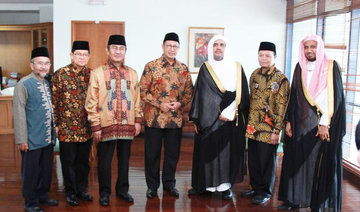JAKARTA: Ahmad met his friends Udin and Ari at a mosque, and Ari asked him why he had not been around for some time.
When Ahmad said he had just returned from Syria, Ari replied in awe that he, too, wanted to go there to wage "jihad".
When a teacher approached them and asked Ahmad the same question, Ari replied, saying: “He (Ahmad) just returned from Syria to wage jihad. Isn’t that cool?” But Ahmad told both men the caliphate propaganda was false and many innocent people had been killed in the name of the caliphate.
“They were Muslims just like us,” he said. The teacher closed the conversation by saying that Ari had learned his lesson and should understand he did not have to go far to wage jihad. The teacher then asked Ari to join him assisting elderly people.
“This is also jihad,” he said.
Ahmad, Udin and Ari are characters in an animated film entitled “Kembali dari Syria,” or “Returning from Syria,” produced by the Center for the Study of Islam and Social Transformation (Cisform) at Sunan Kalijaga State Islamic University in Yogyakarta. The short film — one of 20 animated clips produced to counter extremism among teenagers — was launched in Jakarta on Wednesday, following the February release of the other productions in Yogyakarta.
Mohammed Wildan, Cisform’s director, told Arab News the films had been made to counter radical propaganda after earlier efforts to publish two short comics largely failed because of the poor reading habits of Indonesian teenagers.
“We decided to develop these animated short clips to expand our reach. They will be more accessible through social media,” Wildan said.
Most of the clips are between 90 seconds and three minutes long, depending on the content.
Wildan said the real challenge was to condense the message with the correct reference to Qur’an and package it in a maximum three-minute clip.
“We are careful when choosing our arguments that cite the Qur’an and the Hadith,” Wildan said.
Lecturers from the university had offered their expertise on specific subjects, he said.
Also present at the film launch was 20-year-old Nur Shadrina Khairadhania, who went to Syria as a teenager with her extended family. She shared her own account of emigrating to the so-called caliphate and explained why going to Syria to wage jihad was wrong.
Speaking to an audience of high school students, Khairadhania said that after her interest in Islam began to grow, she fell victim to Daesh online propaganda introduced to her by an uncle.
“I watched their videos, which showed that life would be really good in the caliphate. I was enticed to join,” Khairadhania said.
She convinced her father, Dwi Djoko Wiwoho, a high-ranking civil servant in Batam, Riau province, as well as her mother and two siblings, to migrate to Syria.
A group of 26 extended members of her family, including two uncles and a grandmother, left for Syria in 2015. After 19 managed to cross the border with Turkey, they quickly discovered that life in the caliphate was very different to the propaganda.
“Everything is contrary to Islamic teaching. A male family member was forced to fight and was put in detention for months when he refused,” she said.
The family tried for a year to leave and finally returned to Indonesia in August 2017.
Family members completed a rehabilitation program run by the national counterterrorism agency, but now her father and uncle are facing terrorism charges.
Rebuilding her life had been difficult because of the stigma of her past, she said.
“But God gave me a second chance to live. This is probably my jihad, to tell the truth to people so no one will be deceived like us,” she said.





























